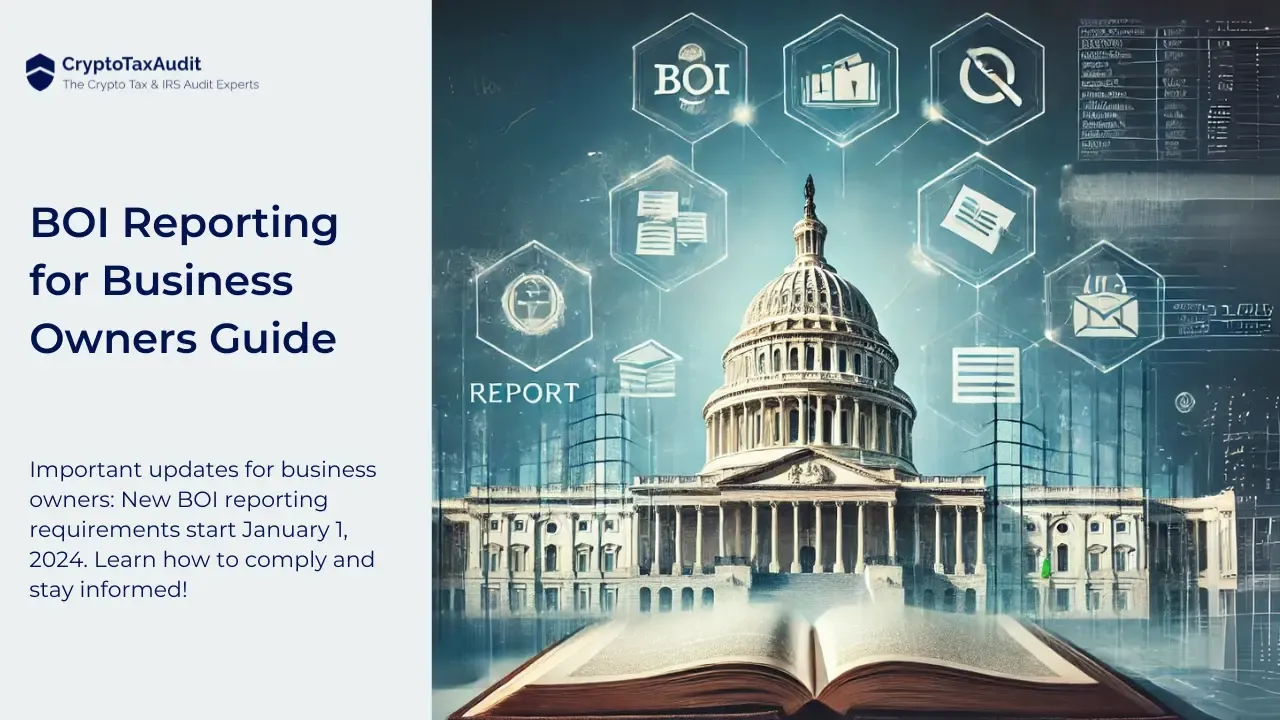
Many crypto traders have not reported all their crypto income to the IRS. We need tax amnesty now to prevent a generation of mostly young people from going to prison. (TCDS-03)
Crypto investors are afraid.
Crypto investors and trader in the United States are afraid of taxes, and for good reasons. Most of them haven’t paid taxes on their crypto income. This is a massive problem. In certain age brackets, tax non-compliance has reached epidemic proportions.
First, I'll explore the clash between a Congress demanding more money and defenseless constituents. Then I’ll make a proposal to heal this rift and increase tax compliance.
Congress provided more money to the IRS.
The IRS is the money-making arm of the US government. Currently, the IRS brings in about $4 trillion a year. The IRS Commissioner told Congress that if they were given additional funding, the IRS could bring in another $1 trillion.
Since our government goes deeper into debt each year, it needs the money. So, Congress gave the IRS an additional $80 billion in funding. Of that amount, $46 billion was specifically earmarked by law to apply to increased compliance enforcement related to digital asset activities. That funding includes the IRS agents that badges and guns. Yes, the IRS has it's own police force.
That enormous funding now makes digital asset enforcement the #1 enforcement goal for the IRS for the next seven years.
What is this epidemic of non-compliance?
The Gemini exchange did research that stated that there were 33 million crypto owners in the US. Only 8 million tax returns answered YES to the virtual currency question. That’s about 25 million crypto owners not answering YES. These 25 million either failed to report their crypto-related income (let’s call them hiders), or they failed to file a tax return at all (let’s call these non-filers).
Both hiding and non-filing of IRS forms are types of non-compliance and are subject to severe fines or even criminal prosecution.
Who's most at risk from this epidemic?
According to the Gemini report, 70% of these crypto owners are between the ages of 18 and 44. So, you can expect that the IRS crackdown will be most ferocious on this age group.
How did the epidemic happen?
The main reason for this epidemic of non-compliance is ignorance. Taxpayers are in the dark. Most taxpayers still think cryptos are taxed like IRAs, that is that they're only taxed when cash is taken out. However, in the U.S., taxes aren't due just when selling for cash. Taxes are due for gains made when one crypto is traded for another.
CPAs and tax advisors are also in the dark. Most CPAs and tax advisors want nothing to do with the complexities of reporting of crypto-related income. Many are afraid of the liabilities if they do it wrong.
Another reason for this epidemic is that taxpayers are confused when using online crypto gain calculation services. Although these services are certainly very helpful, they can’t seem to keep up with the explosion in new ways to invest in cryptocurrencies and their derivatives.
What are the dangers of this epidemic?
Whether out of ignorance or frustration, a taxpayer may not report his crypto income for one year. Then out of fear of being discovered, he may continue not to report his crypto income in the following years. After a few years, the unpaid tax bill is so enormous that the taxpayer feels they have no hope of getting back to compliance. So they continue not filing. They continue to hide.
Getting back to compliance and paying the taxes due would likely destroy the lives of these taxpayers. It would fill a generation of taxpayers with enormous bitterness and anger against the government. This is not good for the stability of the country. And it's not good for a system that depends greatly on people "voluntarily" reporting their income to the government.
Why is a cure needed now?
The IRS is regularly collecting US crypto exchange data on taxpayers, from 2016 to the present. They demanded this information under tax code section 7604. They are seeking information about US clients and their transaction history.
On February 9, 2023, the IRS filed suit in court to compel Kraken to surrender taxpayer information under section 7602.
Armed with this information, the IRS can see if your tax returns account for all the sell transactions the IRS knows about.
As I discussed in a recent blog on the lack of accuracy of the gain calculation services, they you’ll understand that the IRS will likely calculate the value of your sales transactions much higher than you do.
How can the epidemic be healed?
There is a solution. It's a shortcut to getting people back in compliance. And, most importantly, it's been done several times before. There's a precedent.
The remedy is called tax amnesty.
When I was a kid we would play Hide-and-Seek. When the game was over, to tell those still hiding that it was safe to come out, we would shout, “Ollie, Ollie, Come In Free”.
Getting those who are still hiding to come in is the goal of tax amnesty.
However, it isn’t completely free.
Are there existing programs that could be used?
Yes, the IRS calls tax amnesty “voluntary disclosure” procedures. The current IRS voluntary disclosure program targets tax criminals and is very harsh medicine though it doesn't include any prison time.
Although tax amnesty can be requested on a case-by-case basis, we really need a special disclosure program targeting cryptocurrency compliance. This has been done before for people with offshore bank accounts. There's a precedent and it's a great way to offer a large group of people a final chance to make it right.
A streamlined digital asset procedure.
An existing voluntary disclosure program offers a successful template that can be adapted for crypto taxpayers. It's called the Streamlined Foreign Offshore Procedure (SFOP). Using the SFOP as a template, a Streamlined Digital Asset Procedure could be created. But what would it look like?
I propose the following:
- The taxpayer would file or amend the last 3 years' of tax returns to report digital assets. The taxpayer would not be responsible for fixing digital asset reporting on prior returns.
- The taxpayer would attach a "reasonable cause explanation" to each return for the late filings.
- The taxpayer would file FBAR forms for the last 6 years to report their foreign financial accounts.
- The taxpayer would then pay the taxes owed, plus interest, but wold not pay various fines for failure-to-pay, failure-to-file, or civil penalties related to informational returns.
Digital asset reporting.
Digital Asset reporting would include completing informational forms Forms 8938, 5471, 3520, 8621 and others to report non-US based crypto exchanges, decentralized exchanges used, DAOs, and transactions with anonymous persons.
Willfulness excused.
Typically, reasonable cause is not an acceptable excuse when the taxpayer's actions were willful. Willfulness is a complex legal topic. As mentioned earlier, most crypto hiders and non-filers didn't report initially out of willfulness. However, when the non-reporting continues for multiple years, the taxpayer becomes willful out of fear and ignorance. This transition toward willfulness should not be held against the taxpayer now seeking to become compliant.
Disclosure participation.
Taxpayers participating in voluntary disclosure should also be allowed to use other collection procedures normally available to taxpayers, such as installment agreements, currently non-collectible status updates, and offers in compromise.
Voluntary disclosure works.
Tax amnesty brings in additional tax revenue at low IRS administrative expense. It brings hiders and non-filers into compliance and encourages future compliance.
The goal of the IRS is to collect tax revenue, not to imprison a generation of crypto investors who didn't file properly.
The risk of tax amnesty.
The risk of offering tax amnesty is that it diminishes the perceived fairness of the tax system. Delinquent taxpayers get away with paying less than compliant taxpayers. And, tax amnesty risks diminishing the seriousness of tax fraud and evasion.
Why am I qualified to discuss tax amnesty?
My team at CryptoTaxAudit and I have filed over 1,200 tax amnesty returns with a 100% success rate with everyone enjoying the benefits of amnesty. Honestly, very few tax firms have filed as many tax amnesty returns as I have.
I have filed over 600 returns declaring unreported offshore bank accounts using the IRS Streamlined Foreign Offshore Procedure. And, I have filed over 600 returns using the IRS Delinquent International Information Return procedure.
My team and I are uniquely qualified to speak to help crypto tax clients who are out of compliance and to discuss the importance of a tax amnesty program.
Most taxpayers want to be tax compliant.
When ignorance turns into willful hiding, we need to offer an olive branch to bring back taxpayers who have found themselves in a regrettable place.
What can you do today?

Join the The Crypto Tax Amnesty Initiative. Join the email list to keep up-to-date on what's happening with this initiative. When you sign up, you'll receive some easy-to-user links for you to contact your representatives in Congress to let them know about your support for crypto tax amnesty. And it's easy to do.
Remember that your senators and representatives want to know what you would like to see happen. It's simple. Ask them to instruct the IRS to create a crypto tax amnesty program to a generation of potential tax criminals into compliant taxpayers, without risking their entire future or freedom.
What if it's you?
If you haven't reported your crypto income and are concerned, schedule a private consultation with our team today. Get back into tax compliance!
DISCLAIMER: Opinions and perspectives of the author, host, and guests. It should not be construed as U.S. taxpayer advice. There are often multiple interpretations of tax law. Various strategies may be suited to specific individuals and for particular situations. Seek out professional tax, legal, or financial advice from CryptoTaxAudit or from other reputable companies.




